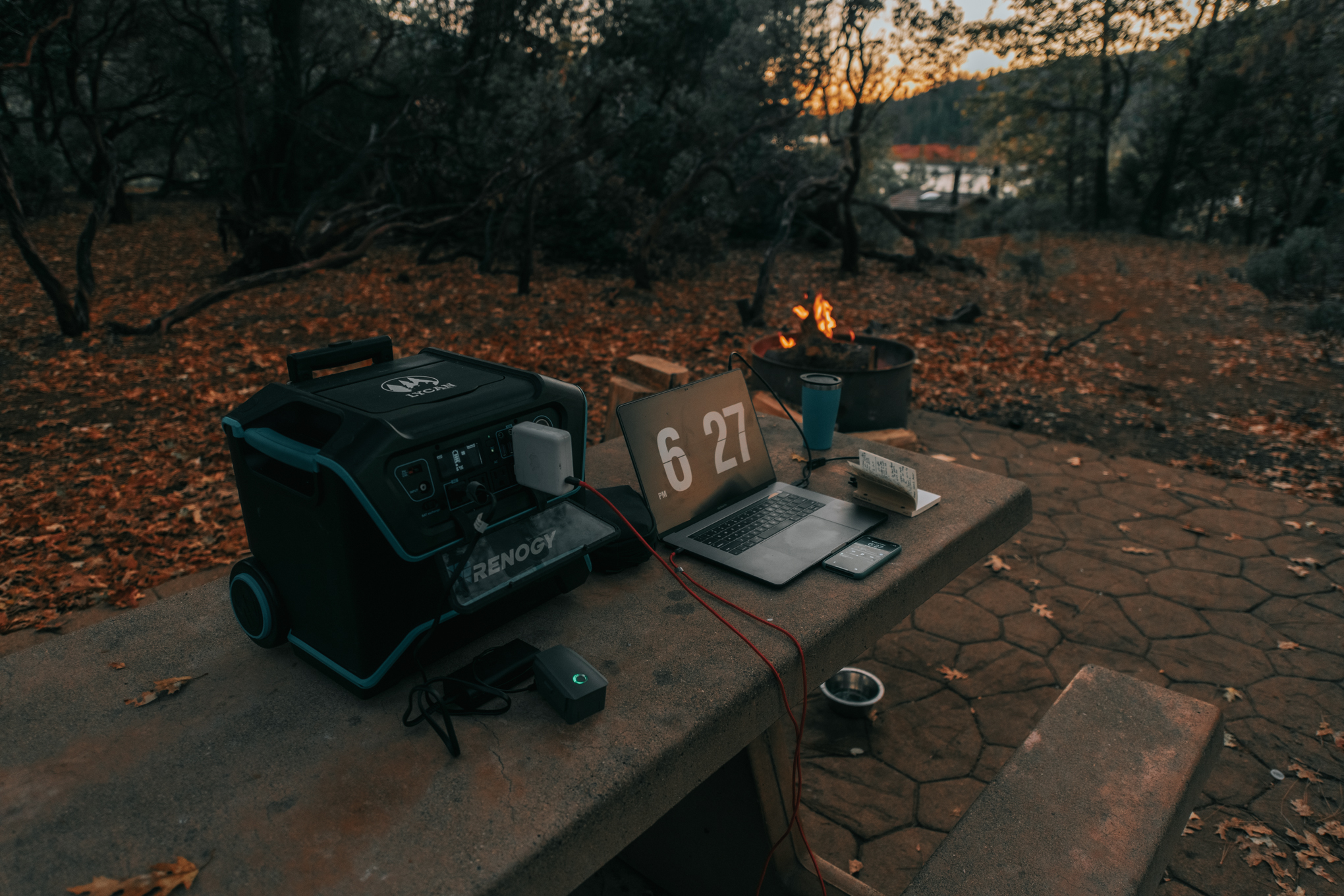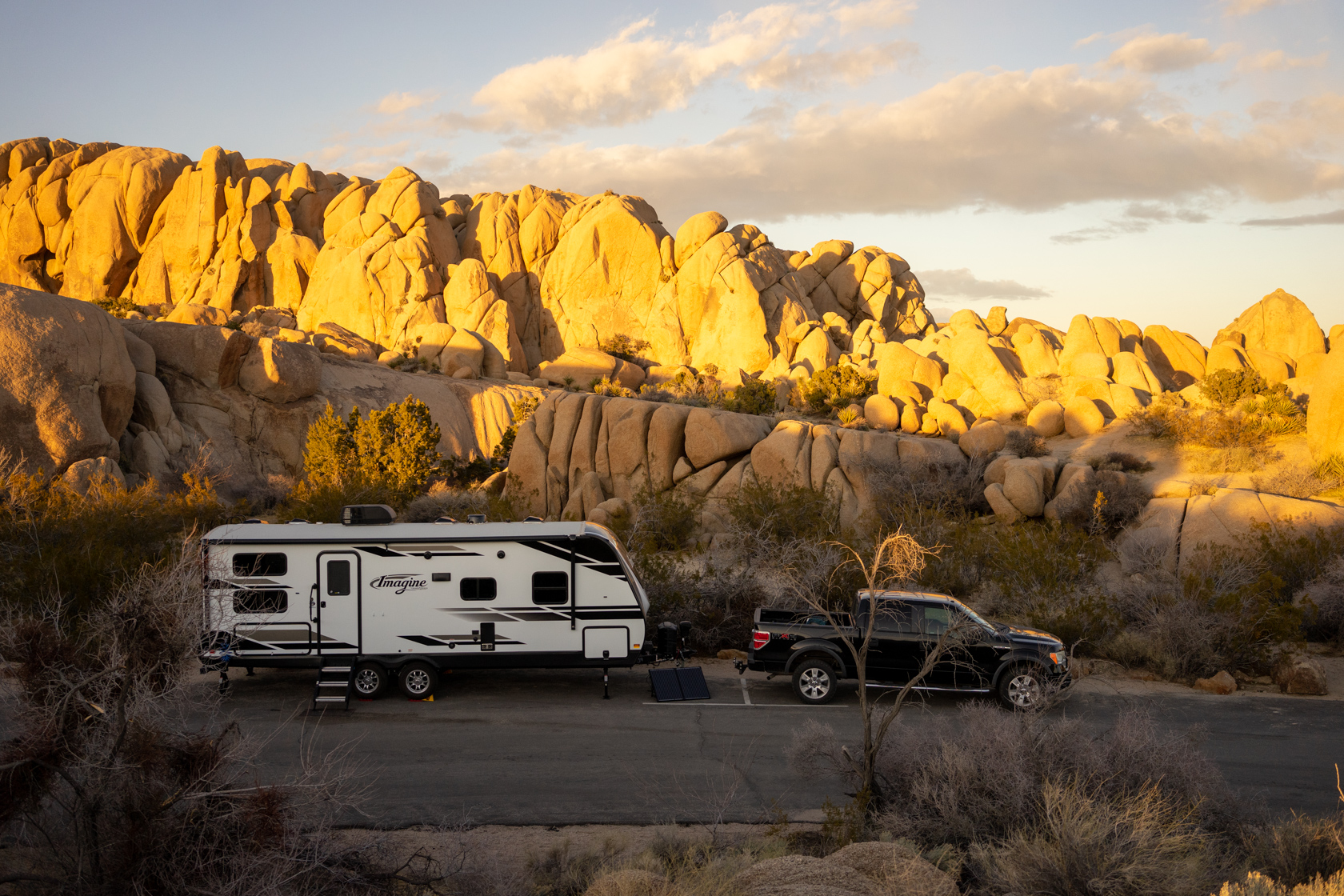A portable solar generator can be a life-saver when you’re out on the road, camping in the wilderness or if the power goes out in your house.
Portable solar generators are a cheap energy option that does require fuel, uses clean, renewable energy, and requires very little maintenance. Sounds great. But is a portable generator the right solution to your energy needs?
Many people wonder if they can use portable generators for their unique energy needs. This guide will help you choose the best portable solar generator for your use case.
What is a portable solar generator?
Solar generators, including portable solar generators, work using solar panels and solar batteries. The solar panels utilize sunlight as a power source, then store it in the battery. The solar power then gets released through a solar inverter, where it gets converted from DC to AC before discharge. This system allows you to store energy for later use, unlike some other solar panel systems.
Some generators will come as an all-in-one portable solar panel kits, or you can buy the components separately.
Portable solar generators are both a power source and a storage solution. Portable solar generators are much smaller and more portable than some permanent solar panel installation setups. However, because they are smaller, they also store less energy than a large solar battery bank which some people install permanently.
When to use portable solar generators
Portable sоlаr gеnеrаtоrѕ аrе ideal for RVs, vans, and camping. However, they’re also a good energy option as a backup power source in emergencies. Some people will install a permanent solar generator if they are in an area that is prone to electrical blackouts. This situation is common in locations that experience hurricanes, tornadoes, or other inclement weather.
What are the pros and cons of solar generators?
Portable solar generators come with both pros and cons, but they’re overall more affordable and eco-friendly than other portable generators that use gas or other fossil fuels.
Pros of solar generators:
Quiet
If you’re a regular camper, you’re probably familiar with the continuous, annoying hum of noisy traditional generators. The quietness of solar generators is one of their biggest pros. Solar generators are blissfully quiet, unlike non-solar portable generators.
You may not realize how loud and annoying traditional generators can be until you’re stuck with them in a smaller space like an RVs, van conversion, or tiny hometiny home. It may surprise you that a typical = generator can measure noise between 60 and 70 decibels – and that’s when it’s heard from 23 feet away! For context, that’s as noisy as a vacuum cleaner and not easy to ignore while you and your fellow campers are trying to get some sleep.
Much of the appeal of camping, traveling in an RV, or living off-grid is to get in touch with nature and enjoy some peace and quiet. So the last thing you want is to hear the humming of your gas generator.
Portable
When compared to other permanent backup generators, the portability of a portable generator is an obvious pro. However, if you need your generator constantly, you may prefer a permanent installation.
A portable solar generator is relatively small and lightweight. Some generators are even small enough to carry with you in a backpack while camping. These make a great portable energy supply that you can take anywhere and everywhere. Small portable generators are particularly
popular with campers, overlanders, or to use in RVs and van conversions.
Lightweight
While the actual generator is small and light, there’s an added benefit to choosing solar power. Portable generators that use fuel may seem light and compact as well, but they require fuel to run. So, if you want to use them regularly, you’ll need to carry around extra gas or fuel. That may be manageable in an RV, but it’s not easy to haul fuel when you’re out camping.
Low cost
Because portable solar power generators don’t require fuel, they’re also far cheaper to run than other generators. Your costs are upfront when you buy the generator and any other components; there are no ongoing fuel costs. Additionally, solar generators are low maintenance. Portable solar generators have almost no potential for mechanical problems, so that costs will be minimal in ongoing maintenance. You also don’t have to change the oil or replace air filters.
Eco-friendly
Unlike gas-guzzling portable generators, solar generators have low emissions and are a renewable source оf еnеrgу. They’re much more eco-friendly than a conventional diesel or gas portable generator that requires propane or other fuel.
Unlike internal combustion engine-based portable generators, solar generators don’t require fossil fuels, so they don’t produce pollutants – reducing your carbon footprint.
Cons of solar generators:
Upfront costs
Portable solar generators can be more expensive than traditional gas generators. However, portable solar generators have almost no ongoing operating costs. A solar generator isn’t at the mercy of rising fuel costs and other maintenance costs, so they’re the cheaper option over the lifetime of a generator.
Slow recharging
Portable solar generators rely on sunlight to charge. That means in bad weather, such as overcast or rainy days, they can be slow to recharge. If you want to use a generation in a location with low sunlight, then solar power may not be the best option.
Limited power supply
Some portable solar generators have a limited power supply, especially if you opt for one of the smaller and most compact options. Portable solar generators are easy and light to transport, but this pro can also be a con because the size of the solar battery will ultimately limit how much power you can store.
How to pick the best solar generator for you
The right portable generator for you will be the model that best suits your use case; before you start looking for the best portable solar generator, you should consider how you plan to use it. If you want to power all your household appliances in an emergency, you’ll need a bigger battery. If you just want to charge your phone and small electronics while camping, you can choose a small solar generator.
Other factors you should consider include:
Battery Capacity
A portable solar generator runs on its stored energy, so the battery’s capacity is an important consideration. The capacity, or the total amount of electricity the generator stores, needs to be enough for your specific use case.
Power Rating
You should also consider the power rating of a solar power generator. The power rating is the amount of power delivered at a time. A solar battery with a high capacity but a low power rating will typically produce less electricity from the generator but will last for a longer time.
PV Input
Whether a solar panel is part of your generator or within a solar power kit, you’ll need to consider its PV input. The PV input of a solar panel impacts how long it will take for your generator to charge. The higher the panel’s PV input, the quicker your solar generator will charge. A high PV Input can be a significant factor in your purchase if you need a portable generator that’s fast charging.
Battery Type
Your battery choice is another important consideration when choosing the right portable solar generator. Lithium-ion and lead-acid and batteries are the most common solar battery options.
Lithium-ion batteries are frequently used to run power tools. Lithium-ion batteries are becoming more common in solar-powered generators because they’re very lightweight. They are usually the more expensive option but typically have a longer lifespan. This battery choice can save money in the long term on replacement batteries.
Lead-acid batteries are good at powering things like vehicles and are typically the cheapest battery option. However, they don’t last as long as lithium-ion batteries.
Charge Controller
A charge controller regulates the electric current between a generator’s solar panels and the battery. The simplest solar charge controllers will cut the power when they reach the maximum voltage. More sophisticated and expensive options will instead use three- power point tracking (known as MPPT).
Inverter
Most portable solar generators are equipped with inverters. However, in some cases, you may purchase this component separately. An inverter is responsible for converting the DC power generated by the sun into AC power which most appliances and electronics can use. An inverter will also determine how much solar energy you can get out of your solar generator when it’s fully charged.
When considering different portable solar generators, you should compare the inverters. Look for an inverter proportional to the generator’s power, so you get the maximum system efficiency. Pure sine wave solar inverters are arguably the best inverter types on the market, but they can be more expensive than lower-quality inverters.
Weight
The weight of your portable solar power generator is a significant consideration for anyone who is traveling by foot or bike. Even those traveling in RVs will want to be mindful of their generator’s weight.
Portability
All portable solar generators are portable by nature, but some models are easier to transport than others. The purpose of the solar generator will determine how mobile you need it to be. Some solar batteries are bulkier or heavy, so they’re not suitable for camping. Other portable solar generators might come with built-in wheels, which can be handy in some situations but adds weight. You may have to compromise on the generator’s storage capacity if you need increased portability.
What size portable solar generator do I need?
Your end-use case will determine what size generator you need. Smaller generators, for example, those under 1,000 watts, can power small electronics and appliances such as laptops, cell phones, and small lights. Larger generators which are between 1,000 watts and 3,000 watts can effectively power much larger devices and appliances, such as a microwave, freezer, or refrigerator. If you want to power your entire house using solar power it would require much larger solar generators with more than 5,000 watts of power. You can use our solar panel calculator to help work out how much energy you would need.
Conclusion
Portable solar generators are a much more eco-friendly option than traditional gas generators. A compact and small generator allows you to quickly head out on a road trip or camping adventure with portable solar-powered generators. Portable solar generators also bring peace of mind that you have a backup power source in an emergency.
Remember that no portable solar generator will be able to power your entire home off-grid effectively. If this is the solution you’re looking for, you should instead consider installing a permanent solar power system paired with adequate battery storage.







